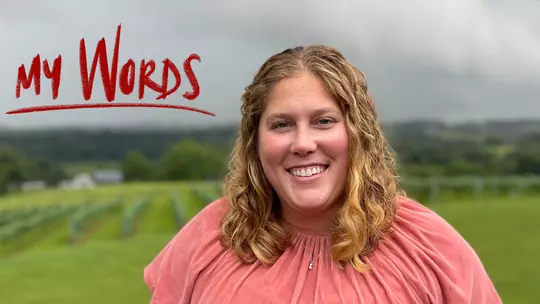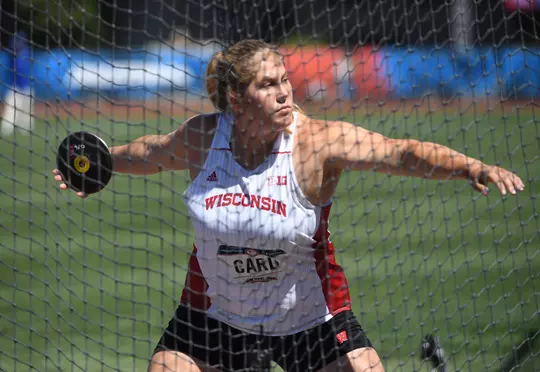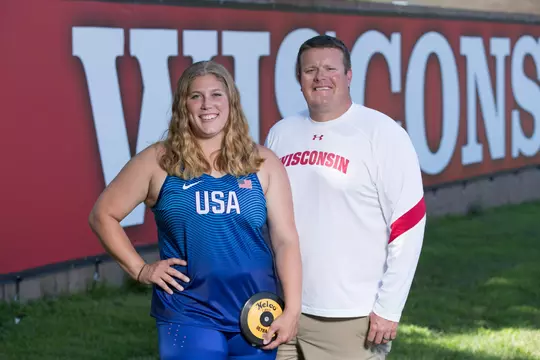
My Words: Strength doesn’t always mean muscles
My own struggles with mental health put me on a path to help others
Kelsey Card
5/23/2024
I was a freshman on the Wisconsin women’s track team in 2011 when I first thought of quitting. It got to the point where I once drove home to Illinois and almost didn’t come back. I was not in a good place and I was incredibly unhappy.
I was struggling with homesickness. I had a teammate who wasn’t a very big fan of mine, so I was trying to navigate that, as well as adjusting to Wisconsin’s rigorous academic demands. Also, my now-husband and boyfriend at the time was going to school in California, so I was having difficulty being so far apart from him. On top of all that, I had been a three-sport athlete in high school and the change to training and competing for a solo sport was proving to be quite the challenge for me.
I did not quit then, but things didn’t improve a whole lot early in my sophomore year. I had been told to plan on a redshirt from my head coach at the time and it was pulled – leaving me very frustrated – and I began to spiral emotionally. I really wasn’t doing so well and I hated everything. I hated the world. I hated track and I was super negative. My state of being had gotten bad enough that one of my coaches called my mom to have her come visit me because he was really worried about me.

At one point during that dark time, I saw a flash of light. One of our athletic trainers mentioned that UW student-athletes had access to free mental health services, including a sports psychologist. Taking the step to see Dr. Kris Eiring changed my whole life.
I started working with her and gradually came out of the funk I was in. Instead of wallowing in things I couldn’t do anything about, I looked to things that were under my control. I found strength in this mindset and grew my mental toughness from there. I shifted my attention to me instead of worrying about others. It was really a huge moment for me.
I recognized how important my head space was to my daily life and my athletic career when I started working with Dr. Kris. She was a former record-setting sprinter for the Badgers, so her perspectives were so spot on. You can have all the skill and athletic prowess in the world, but if your head’s not with it, it doesn’t really matter, especially being in such an individualized sport as track and field where, as a discus, shot put and weight thrower, you can literally find yourself performing alone in a cage.

I felt the importance of mental strength long before I came to Wisconsin. When I was in middle school, doing the throws events were seen as something to do when you were not good at anything else, or you fell into a fat, slow person trope.
I faced further negativity when I got to high school and found out how cruel my peers could be. I often received jeers of “Number 27 is a man” from opposing teams’ student sections when I played volleyball and basketball.
Being an awkward teenage girl, of course it stung. I was always severely self-conscious of my body. Yet even though it sucked to hear those things, I had to remind myself that I was built differently and it was what helped me to do what I wanted to do athletically. Luckily, I was very strong-willed and had a deep need to prove those people wrong. This helped me to naturally bring my focus during sporting events to what I could control and how I performed.
It also didn’t hurt that my motivation was given a boost due to the fact that my coach would give us ice cream if we gave enough “facials” or times we hit opponents in the face with a volleyball during a match.

Growing up with a mom in the mental health field gave me some beneficial groundwork when I dove deep into my sports psychology work in college. Then there was Dr. Kris, who I connected with on many levels. She got what it meant to be a Badger, what that looks like, the importance of that, the prestige that comes with that. She also understood the pressure, anxiety and drive to be successful.
Our relationship helped lay the ground work for me to make two U.S. Olympic teams in 2016 and 2020 and win an NCAA title in the outdoor discus in 2016.
It also enabled me to talk at length about one of my favorite topics. National Mental Health Month – which is in May – is all about raising awareness of that and normalizing it, letting other people know they’re not alone.
National Mental Health Month is all about raising awareness of that and normalizing it, letting other people know they’re not alone. It’s incredibly meaningful to me when someone says they feel seen or empowered to better their own mental health after hearing my story."Kelsey Card
Throughout my time at Wisconsin, I was fortunate to have Dave Astrauskas as my throws coach. He was always there for me. Don’t get me wrong, we had our rough days of misunderstanding and frustration, but we always came back together and collaborated and worked to get where we needed to go. We both put in the effort to make things happen. I knew he was there for me and was invested as much as I was. He helped me grow and be confident in myself.
My head coach at Wisconsin, Mick Byrne, talks all the time about being Badger tough and that’s huge because, as I said about track, it’s just about you and what we’re doing is so hard and so taxing.
I started out my academic career in pre-nursing because I’ve always wanted to help people and work with people, but I found out really quickly that blood and needles aren’t my jam. Turns out it was my mom, Andrea, who steered me down the road I’m on now. She has a master’s degree in counseling and works in a middle school back home.
My time with Dr. Kris, and encouragement from my mom, enabled me to pursue a career in mental health and speak at length about what has become my passion. National Mental Health Month is all about raising awareness of that and normalizing it, letting other people know they’re not alone. It’s incredibly meaningful to me when someone says they feel seen or empowered to better their own mental health after hearing my story.

I’m now a licensed marriage and family therapist – you can find me under Elephant in the Room Counseling – with an eye toward pursuing my doctorate. I deal with a host of clients, but my student-athletes are the most near and dear to my heart. I’m able to see more than just the athlete sitting in front of me. I see their families, friends, academics and the relationships all in a state of flux and all having an impact on them. I’ve been in that chair. I’ve been them. I’ve been on the field. I’ve lived it. I’ve endured.
One of the things that’s most important is that they’re student-athletes and I think folks forget that. They’re still young. They need to be seen as a person. Athletics are just one part of their lives. Ultimately, one of the hardest lessons I’ve had to learn as a therapist has roots in my lessons learned as a client. I can only control me. I can’t fix things for my clients. I can’t do it for them. I can throw as many life rafts as possible, but they still have to grab one.
I can’t work harder than my clients. I will work just as hard as them, but I can’t work harder or do more than them. That’s really important to think about it when working in the realm of athletics.
At the end of the day, I kind of found my why working with Dr. Kris. I learned that I couldn’t do it for my coach. I couldn’t do it for my family or my hometown. It had to be for me because at the end of the day, I can only control me.
So, it is.

